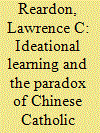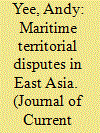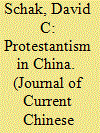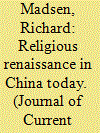| Srl | Item |
| 1 |
ID:
109904


|
|
|
|
|
| Publication |
2012.
|
| Summary/Abstract |
This paper discusses the growth differentials between Chinese provinces geared to agricultural activities and those that have focused on industrial production over three decades of economic reform. Following Hansen and Prescott's (2002) model, we suggest that the differences between regions stem from the resource allocation in place at the beginning of the reform process. We show that provinces with high initial shares of industrial production (the industrial club) have converged, and that agricultural provinces that have shifted to industrial production have been catching up with provinces that were industrialized at the outset. Provinces that have clung to an agricultural strategy (the agricultural club) show no evidence of convergence and appear to have been left behind in terms of economic development.
|
|
|
|
|
|
|
|
|
|
|
|
|
|
|
|
| 2 |
ID:
109122


|
|
|
|
|
| Publication |
2011.
|
| Summary/Abstract |
The Chinese Communist Party has shown tolerance, if not direct support, for the growth of Buddhism over the last few decades. Three explanations for this lenient attitude are explored in this article. The flourishing of Buddhism is encouraged by the state less for its propaganda value in foreign affairs than for its potential to lure tourists who will, in turn, represent a source of revenue for local governments. Buddhist institutions are also establishing their track record in the management of philanthropic activities in impoverished area where local governments lack the resources to offer specific social services. Finally, the development of such activities has contributed to enhance cooperation between China and Taiwan, whose governments have a vested interest in the improvement of relations across the Strait. The article concludes that the growth of Buddhism in China results from the initiatives of Buddhists themselves, and the government supports this growth because it serves local politics well.
|
|
|
|
|
|
|
|
|
|
|
|
|
|
|
|
| 3 |
ID:
109119


|
|
|
|
|
| Publication |
2011.
|
| Summary/Abstract |
During the 1980s, Chinese policy elites underwent a process of complex learning in economic policy that resulted in a shift from a revolutionary to a techno-economic paradigm that greatly reduced the control of the Chinese Communist Party over the economy. Spillover from the sectoral paradigm shift affected other policy sectors, which forced policy elites to experiment with religious policies that would complement the new economic paradigm. This experimentation fostered the growth of a civil society that could assume the social responsibilities cast off by the reforming state-owned enterprises. However, the experimentation also empowered distributional coalitions such as the Falungong, which threatened the party's control. Policy elites thus implemented adaptations of religious policies formulated under the revolutionary paradigm. The study concludes that the current conflict between the Vatican and Beijing resembles an iterated prisoner's dilemma and that the conflict will continue until Chinese policy elites realize that the failure of religious policy adaptations threaten the long-term goals of the techno-economic paradigm.
|
|
|
|
|
|
|
|
|
|
|
|
|
|
|
|
| 4 |
ID:
109126


|
|
|
|
|
| Publication |
2011.
|
| Summary/Abstract |
This article systematically compares maritime territorial disputes in the East and South China Seas. It draws on the bargaining model of war and hegemonic stability theory to track the record of conflicts and shifts in the relative power balances of the claimants, leading to the conclusion that certainty and stability have improved in the South China Sea, with the converse happening in the East China Sea. To enrich the models, this article also considers social factors (constructivism) and arrives at the same conclusion. This calls for a differentiated methodological approach if we are to devise strategies to mediate and resolve these disputes.
|
|
|
|
|
|
|
|
|
|
|
|
|
|
|
|
| 5 |
ID:
109120


|
|
|
|
|
| Publication |
2011.
|
| Summary/Abstract |
This paper examines the relationship between the Chinese state and Protestantism. It demonstrates that it varies widely from place to place; moreover, the actual relationship between individual churches and the local authorities that are supposed to govern them paints a quite different picture from that implied by the laws and regulations. The paper also argues that the state faces a dilemma: On one hand it feels threatened by the appearance of autonomous organizations such as unregistered churches, while on the other it values the contributions they make to society and recognizes that subjecting them to the Three-Self Patriotic Movement and China Christian Council would require a good deal of force and be very socially disruptive.
|
|
|
|
|
|
|
|
|
|
|
|
|
|
|
|
| 6 |
ID:
109118


|
|
|
|
|
| Publication |
2011.
|
| Summary/Abstract |
Since the beginning of the Reform Era in 1979, there has been a rapid growth and development of religious belief and practice in China. A substantial new scholarly literature has been generated in the attempt to document and understand this. This essay identifies the most important contributions to that literature and discusses areas of agreement and controversy across the literature. Along with new data, new paradigms have developed to frame research on Chinese religions. The paradigm derived from C. K. Yang's classic work in the 1960s came from structural functionalism, which served to unite research in the humanities and social sciences. However, structural functionalism has been abandoned by the new generation of scholars. In the humanities, the most popular paradigm derives from Michel Foucault, but there are also scholars who use neo-Durkheimian and neo-Weberian paradigms. In the social sciences, the dominant paradigms tend to focus on state-society relations. None of these paradigms fully captures the complexity of the transformations happening in China. We recommend greater dialogue between the humanities and social sciences in search of more adequate theoretical frameworks for understanding Chinese religions today.
|
|
|
|
|
|
|
|
|
|
|
|
|
|
|
|
| 7 |
ID:
109124


|
|
|
|
|
| Publication |
2011.
|
| Summary/Abstract |
This article examines the impacts of two types of social capital - bonding and bridging - upon the performance of grassroots selfgovernment institutions in rural China, based on an original survey of 410 villages throughout the whole of China. The findings indicate that, on the one hand, bonding social capital still has a very solid foundation in the rural areas of China. On the other, bridging social capital is in formation in Chinese villages, even though the stock of bridging social capital is currently very moderate. Moreover, this study finds that bridging social capital, as manifested in general trust and inclusive social networks, positively affected the governance performance of each surveyed village. Yet, bonding social capital, as manifested in particular trust and exclusive social networks, tends to negatively impact the performance of Chinese rural governance. These findings help clarify some theoretical issues about, and shed some light on the prospects of, the rural self-governance system in China.
|
|
|
|
|
|
|
|
|
|
|
|
|
|
|
|